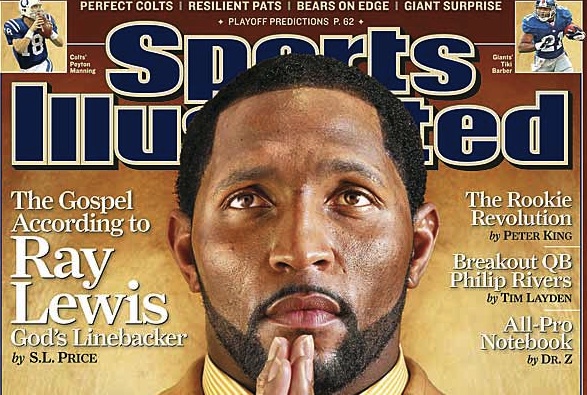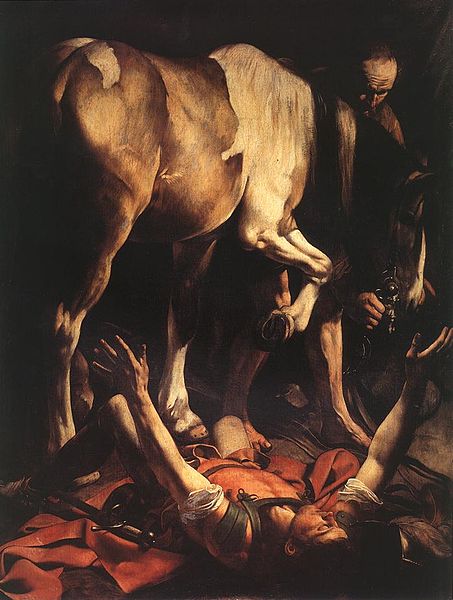Later on today, the eyes of a billion or more people will turn to the Super Bowl, and featured front and center will be the last game played by the legendary Baltimore Ravens linebacker, Ray Lewis. Lewis has announced his retirement after 17 years, and most football aficionados consider him one of the greatest linebackers ever, along with Lawrence Taylor and Dick Butkus. He has been named to the Pro Bowl 13 times, and was the 2001 Super Bowl MVP.
Lewis is also among the most polarizing figures in football, with many acknowledging him not just as a great player, but also as the most motivational leaders in sports. Others who admire his skills cannot pull for him, thinking that he got away with murder, after being involved in obstruction of justice to a double murder in 2000. He may have taken some performance enhancing drugs—from the by now infamous “deer antlers”—to help him recover from his injuries.
Lewis is one of the Christian athletes who speaks openly and vocally about his faith. He openly acknowledges God’s plan for his team advancing to the Super Bowl:
“Man said I wouldn’t be playing the season again, but I’m back. Man doesn’t dictate what you do or how you do it. If you believe in God, believe in God; have your faith in him. That’s where my faith lies.”
 S.L. Price of Sports Illustrated called him “God’s linebacker.” In often tearful testimonies that have been both praised and mocked during the playoffs, Lewis acknowledges the role of God in his team’s performance. His catch-phrase of “Too blessed to be stressed” is likely to have an afterlife well beyond the Super Bowl. He has dismissed those who attribute his “miraculous” recovery to deer-antlers as “trick of the devil.”
S.L. Price of Sports Illustrated called him “God’s linebacker.” In often tearful testimonies that have been both praised and mocked during the playoffs, Lewis acknowledges the role of God in his team’s performance. His catch-phrase of “Too blessed to be stressed” is likely to have an afterlife well beyond the Super Bowl. He has dismissed those who attribute his “miraculous” recovery to deer-antlers as “trick of the devil.”
Much of the debate about Lewis so far been the “religious or criminal” question. Yahoo sports asks:
Win or lose, Lewis’ legacy is a daunting one to consider. Is he a hero who has turned his life around to the point that it’s unfair to bring up his distant past? Or is he an opportunist who uses a religious song and dance to cover the fact that he’s willing to take PEDs to further his final cause?
As both a sports fan and a religion scholar, I wonder if we are not missing the point here. The very paradigm of “religion” vs. criminal assumes that those on the side of religion are pure, unblemished, goody good folks, set apart from a community of criminals. And yet, this is simply not how the history of most religious traditions reads.
The story of religion, much of religion, is not that of purity, but rather one of redemption. It is that of sinners becoming saint. It is the legacy of those with blood on their hands having not just their hands but their hearts washed by God’s grace.
We have seen this story time and again in human religiosity. Rumi’s disciples were nasty, filthy, rude and crude. When the king of the area—himself one of Rumi’s admirers—commented on their lack of manners, Rumi said: “I took them on because they are rude and crude. If they were already beautiful, I would have become their disciple.”
The early Muslim mystic Fozayl ibn Iyaz used to be a thief before repenting and turning his life around to become one of the great saints of Islam, the “friends of God” (awliya’). In fact the story of almost every single “friend of God” in early Islam begins with a repentance account (tawba) which depicts their conversion from a life of sin and crime to saintliness.
In a Christian context of course we have the tradition of St. Paul, who used to persecute Christians before becoming the rock of the Church. The fall of Saul, as he was known then, from his horse whole on the road to Damascus became an iconic reminder of conversion and transformation. Caravaggio’s “The Conversion on the Way to Damascus” captures this iconic moment of the transformation of a sinner to a saint.
In a Buddhist context we have the princely Siddhārtha Gautama, who renounced materialism to achieve enlightenment as the Buddha.
In most religious traditions, the story is one of redemption. I do not know or claim or know what’s in Ray Lewis’ heart, or to speak about the faith that he has or does not have in God. That is between him and God. Nor do I claim to know what really took place in that night which left two men dead. Lewis had his day in court, and was not found guilty of murder, and pleaded to obstruction of justice.
Here is what I do know: Even if Lewis was a sinner, and turned to faith to turn his life around, there is no reason to see him as “using” religion. The history of human religiosity is indeed filled with sinners-turned-saints. It cannot simply be a matter of “bygones”, but a grace that accompanies a re-orientation towards the good and the beautiful, a life of sin towards service.
Religion is not for already-good-and-beautiful people, it is for sinners like all of us who aspire to be something more.
If this is indeed Lewis’ tale, he is in good company with many religious figures throughout human history.








